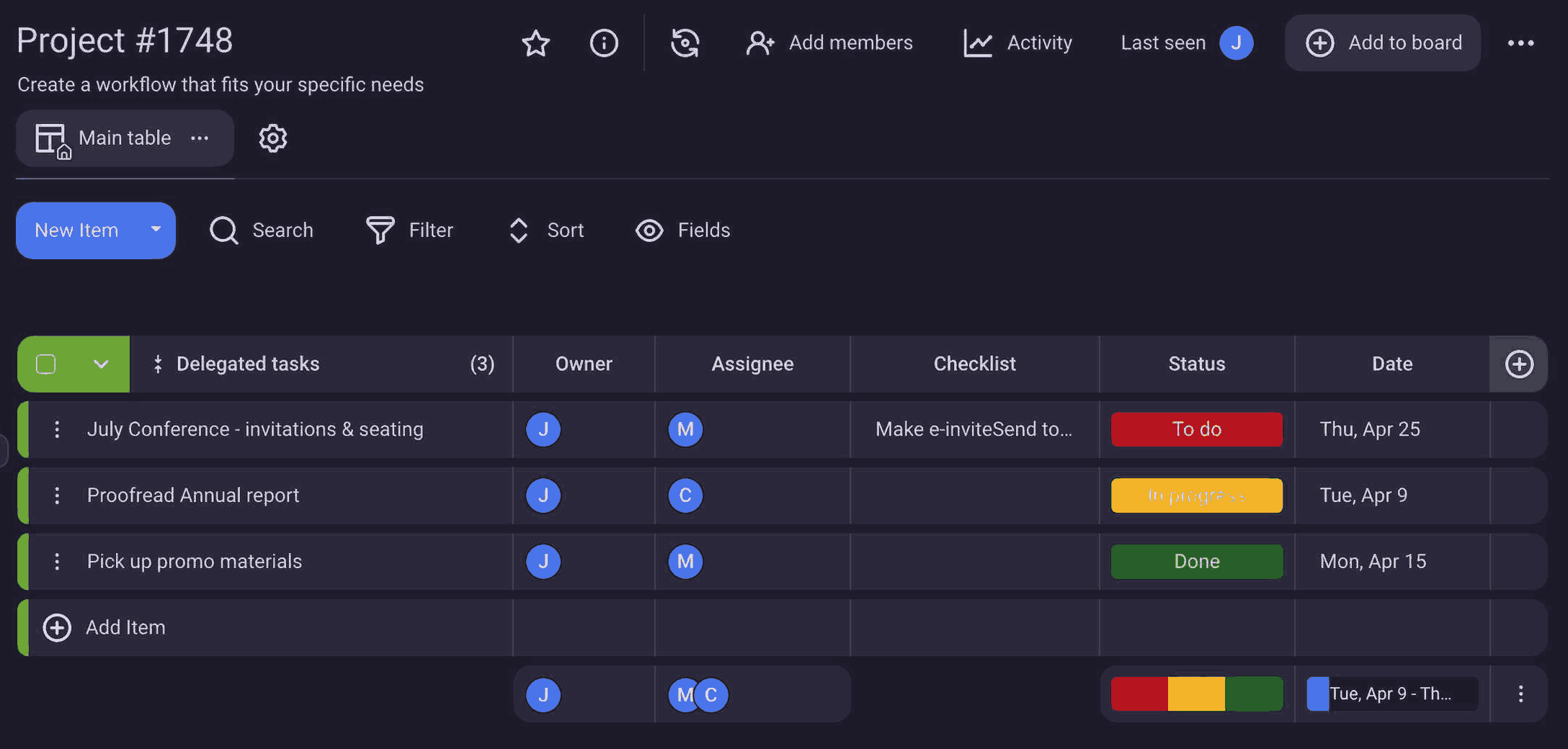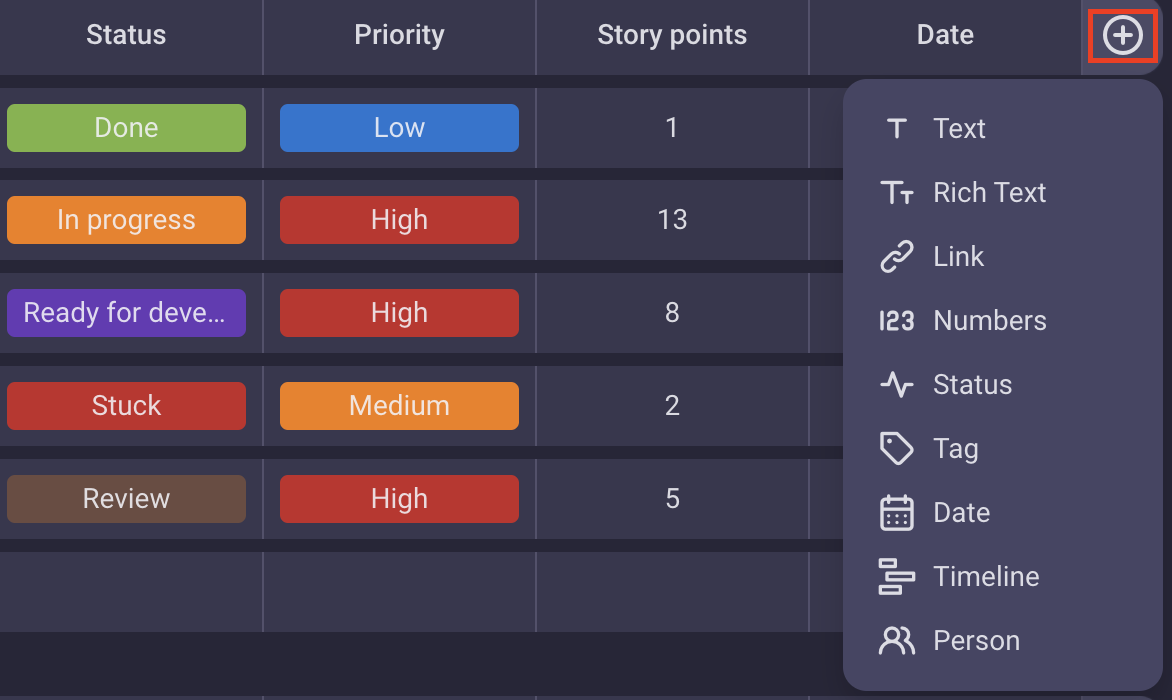Delegating tasks is an important part of project management. Depending on the person, delegation might sound like either an easy way out or the most difficult thing ever — but it doesn’t have to be either.
Project managers tend to have long to-do lists and sometimes simply can’t do it all by themselves. And that’s okay — they don’t have to.
Through delegation, the leader offloads some of their burden, while a team member gets to expand their knowledge and experience.
This article will explain why delegation is important, when to go for it, how to delegate work to employees, and more!

What is task delegation?
Delegation in project management refers to the transfer of work, authority, and responsibility by a leader to a team member. This implies that the employee in question is entrusted with certain decision-making authority regarding the work in question.
Here’s an example: Mary, an experienced project manager, is in charge of organizing a conference hosted by the company. Since she’s very busy with her usual tasks and an upcoming business trip, Mary decides to turn to her trusted assistant, James.
While Mary still plans to tackle matters such as date selection, budget allocation, guest list, etc., James can help by handling the invites, seating arrangements, promotional materials, and other lower-impact duties.
This gives Mary more time for other pending tasks, while James gets to develop new skills or practice what he already knows.
💡 PLAKY PRO TIP
Event planning can go much smoother if you have a template to start with. Here are some templates that cover matters such as budget, catering, venue, speakers, and more:
Why is it important to delegate work?
Effective delegation can be the ideal solution for handling common project management challenges. Moreover, it promotes many important aspects of teamwork and professional growth.
The main benefits of delegating tasks include:
- Creating an experienced project team,
- Reducing excessive workload, thus preventing burnout,
- Building trust and boosting morale, and
- Improving personal and organizational effectiveness.
Our contributor Sasha Dookhoo, Vice President at Crenshaw Communications, a Mod Op Company, agrees:

“Effective task delegation in a team setting is critical to its success. Task delegation enables better cross-team collaboration and learning. Without delegation, junior team members will never have the opportunity to delve into critical tasks on the job, which can hinder their professional development.”
Delegate tasks effectively with Plaky
Why some people shy away from delegation
People typically avoid delegating tasks because they feel it may paint them as incompetent. But it’s quite the opposite — a strong leader knows that reorganizing workloads is sometimes necessary to prevent project failure.
Additionally, some leaders find it difficult to trust that others will get the job done right and feel the urge to micromanage. This can cause further trust issues and other long-term consequences. So it’s essential to practice letting go of total control.
Others think that completing the task themselves would be quicker than teaching a team member to do it. In reality, if provided with clear guidelines and support, the assignee is more than likely to perform well.
Whenever you have any kind of doubt or guilt regarding delegation, try to rationalize it, and remember that delegating is a fundamental project management skill that benefits both you and your team.
How to delegate tasks effectively in 10 steps
If you want to learn how to delegate tasks, take a look at these 10 practical tips.
#1 Identify tasks to delegate
The best thing you can do at the start of any project is create a project task list. That will help you assess what you can delegate if needed.
Let’s look at some questions you can ask to see if a task should be delegated:
- Is this a task that needs no specific expertise on the matter that the team members lack?
- Do other tasks require more of your time and authority?
- Is this a recurring assignment?
- Could this be an opportunity to equip someone with the knowledge they’ll be able to reuse in other tasks?
- Is this a task that fails to spark your passion or motivation?
- Is there room for trial and error?
If most of these get a “yes,” that’s a clear sign you should delegate.
#2 Consider your team members’ strengths
Choosing the right person is key. Check if there’s anyone who has basic knowledge about the matter and is looking to learn more. This can be due to their natural talent or because it aligns with their long-term career goals.
Letting employees state which task they wish to tackle can also be a big motivator since it’s a well-known fact that we perform better when interested in the work.
Another important tip is to consider everyone’s workload. You don’t want to burden someone who’s already busy even if you think they’d do a good job.
#3 Explain why you’re delegating work
Once you’ve completed the first two steps, it’s time to inform the person selected (unless they volunteered, of course).
The first thing that will make them feel capable of performing the task is knowing there’s a specific reason they’ve been chosen. That way, the assignee perceives what their contribution will be and how this could help them grow.
The more an employee understands their role in a task, the more they are likely to care.
#4 Provide clear instructions
Always make sure the person fully understands their assignment. Depending on the complexity of the task, try breaking it down into smaller steps, explain what each of them entails, and set a deadline.
Sometimes, you may also need to equip the assignee with certain tools or resources. If they have never used these tools and resources, don’t forget to help the assignee get a hang of them.
Whenever you delegate assignments, emphasize that you’re willing to answer questions and offer additional explanations if needed. This way, your team members will feel supported and more at ease.

#5 Establish the desired outcome
Knowing the expected result simplifies the process for the employee. It’s crucial to make sure that both sides interpret the expected result in the same way. Although there may be different ways to achieve it, the goal must be crystal clear.
It may be useful to establish criteria the assignee can use to evaluate their work before turning it in (for example, in the form of a checklist).
#6 Remember to stay open to new perspectives
Delegation skills also include openness to fresh ideas and suggestions. Some instructions and objectives may be strict, but others may leave room for creativity.
Accepting their ideas not only motivates the assignee but benefits the organization as a whole since companies that welcome innovation retain more talent.
Remember, an effective leader knows their way might not be the only way.
#7 Delegate responsibility, not just duties
A delegated task should be accompanied by a certain level of decision-making autonomy. Naturally, you should track the progress but entrust the assignee with a degree of authority.
Having to ask for permission again and again could be frustrating and time-consuming for everyone involved.
Even if the assignee faces a problem and attempts to “return” the responsibility to your corner, try to avoid this. Encouraging them to propose solutions and work through the issue could result in valuable lessons.
💡 PLAKY PRO TIP
Allowing employees to make decisions on their own is a vital part of nurturing autonomy in the workplace. Learn how to foster work autonomy from leaders themselves:
#8 Ensure regular communication and feedback
The benefits of effective communication in project management are numerous, but too much of it can be detrimental. You and the assignee should agree on a dynamic that suits you both. Remember, you don’t want to micromanage, but occasional checkups are okay.
Our contributor, Sasha Dookhoo, suggests weekly meetings for monitoring the overall work situation and seeking delegation opportunities:

“My top tip for task delegation is weekly team syncs. In our hybrid and remote work reality, connecting with team members — even if for a few minutes a week — is of the utmost importance. This allows managers to build rapport with teams but also serves as a touchpoint to determine what’s upcoming for the week and what tasks can be delegated to other team members.”
Don’t hesitate to provide feedback when the assigned tasks are underway if it’s something that will help keep the assignee on the right track. Conversely, be open to receiving feedback so that your delegation skills can develop as well.
The most convenient way to do this nowadays is through the use of team communication and collaboration tools. This typically feels comfortable for both sides as it maintains a relaxed atmosphere.

#9 Acknowledge efforts and achievements
We all know how nice it is to feel that your hard work is seen and valued. Recognition and appreciation are two equally important things in a work setting.
In this case, it means that employees need both praise after a job well done and the acknowledgment of their worth within the team.
#10 Evaluate and learn from the task delegation progress
Once the delegated task is completed, both sides should express what they feel went well and what could be done better next time.
Over time, this learning cycle will lead to a practically ideal delegation process in which everyone is well-coordinated and satisfied. Furthermore, this way, you avoid burnout, some colleagues become ready to move to higher positions, and the company benefits from refined processes.
💡 PLAKY PRO TIP
Learning from past experiences helps us grow and improve. To learn how to capture lessons learned and apply your findings in future projects, check out this blog post:
Delegate effectively with Plaky
Plaky is a task management software solution with versatile and customizable features that can facilitate task delegation.

The software allows you to create multiple workspaces and boards (public or private) so that you can monitor all your projects in one place. Furthermore, you can use Plaky to break down projects into tasks (items), whereby you can specify:
- Task description,
- Status (to do, doing, on hold, done, etc.),
- Assignee,
- Due date,
- Priority level,
- Reviewers, and more.

You can also add files, links, comments, and @mention specific users if needed. That way, important resources, documents, instructions, remarks, and feedback are all in one place.
This is much easier than, let’s say, going through multiple folders and emails or email threads.
Instead, you can rely on the filter option to find tasks referring to a certain employee/group, date, tag, board creator, and other criteria.
A team member will always receive a notification if you assign a task to them. Within the notifications menu, every user can see the list of all the assignments given to them, thus preventing omissions and oversights.

The UI design is intuitive and easy on the eye. You may also choose between a light and dark theme, which is always handy.
Plaky is suitable for virtually any company, regardless of its size or industry. There are different pricing plans, including a strong forever-free plan that can accommodate an unlimited number of users, boards, items, and views.
If you want to make delegating work and management in general easier, sign up for Plaky today.
